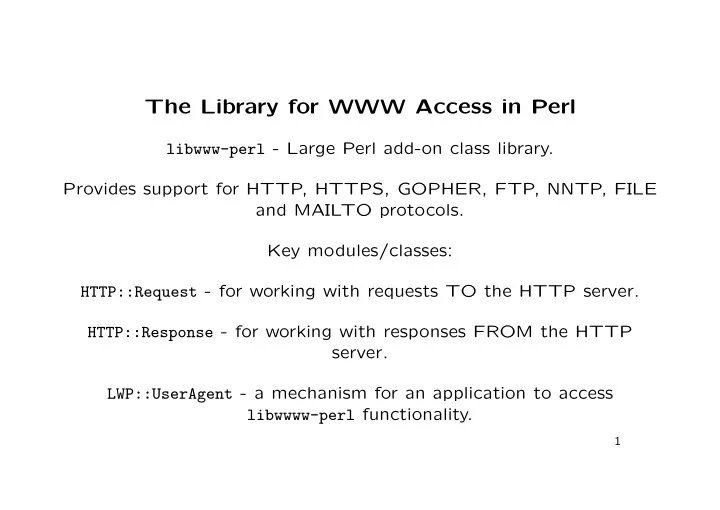

The Library for WWW Access in Perl libwww-perl - Large Perl add-on class library. Provides support for HTTP, HTTPS, GOPHER, FTP, NNTP, FILE and MAILTO protocols. Key modules/classes: HTTP::Request - for working with requests TO the HTTP server. HTTP::Response - for working with responses FROM the HTTP server. LWP::UserAgent - a mechanism for an application to access libwwww-perl functionality. 1
The LWPwwwb Program #! /usr/bin/perl -w use strict; use LWP::UserAgent; my $http_method = shift || ’GET’; my $http_server = shift || ’localhost’; my $html_page = shift || ’/index.html’; my $http_port = shift || 80; my $wwwb_useragent = new LWP::UserAgent; my $wwwb_url = ’http://’ . $http_server . ’:’ . $http_port . $html_page; my $wwwb_request = new HTTP::Request $http_method => $wwwb_url; my $wwwb_response = $wwwb_useragent->request( $wwwb_request ); print $wwwb_response->as_string; 2
Parsing HTML, 1 of 3 #! /usr/bin/perl -w use strict; use LWP::UserAgent; use HTML::Parser; sub print_dtext { my ( $parser, $text ) = @_; print "text -> ", $text, "\n\n"; } sub end { my ( $parser ) = @_; $parser->handler( text => undef ); $parser->handler( end => undef ); } 3
Parsing HTML, 2 of 3 sub print_link { my ( $parser, $tag, $attr ) = @_; if ( $tag eq ’a’ ) { print "link -> ", $attr->{href}, "\n"; $parser->handler( text => \&print_dtext, ’self,dtext’ ); $parser->handler( end => \&end, ’self’ ); } } 4
Parsing HTML, 3 of 3 my $http_method = shift || ’GET’; my $http_server = shift || ’localhost’; my $html_page = shift || ’/index.html’; my $http_port = shift || 80; my $wwwb_useragent = new LWP::UserAgent; my $wwwb_url = ’http://’ . $http_server . ’:’ . $http_port . $html_page; my $wwwb_request = new HTTP::Request $http_method => $wwwb_url; my $wwwb_response = $wwwb_useragent->request( $wwwb_request ); my $parser = HTML::Parser->new( api_version => 3 ); print "Parsing $http_server$html_page on port: $http_port:\n\n"; $parser->handler( start => \&print_link, ’self,tagname,attr’ ); $parser->parse( $wwwb_response->content ); $parser->eof; print "\nDone.\n"; 5
Some parsewwwb Examples ./parsewwwb GET www.linuxjournal.com ./parsewwwb GET www.itcarlow.ie ./parsewwwb GET pbmac.itcarlow.ie ./parsewwwb GET pbmac.itcarlow.ie /manual/index.html 6
The Custom Web Server Source Code, 1 of 5 #! /usr/bin/perl -w use strict; use POSIX ":sys_wait_h"; use HTTP::Daemon; use HTTP::Status; use constant HTML_DEFAULT_PAGE => "index.html"; sub zombie_reaper { while ( waitpid( -1, WNOHANG ) > 0 ) { } $SIG{CHLD} = \&zombie_reaper; } $SIG{CHLD} = \&zombie_reaper; 7
The Custom Web Server Source Code, 2 of 5 sub continue_as_child { my $http_client = shift; while ( my $service = $http_client->get_request ) { my $request = $service->uri->path; print $service->method, ": ", $request, " -> "; if ( $service->method eq ’GET’ ) { my $resource; if ( $request eq "/" ) { $resource = HTML_DEFAULT_PAGE; } else { $request =~ m{^[./]*(.*)}; $resource = $1; } 8
The Custom Web Server Source Code, 3 of 5 print $resource, " -> "; if ( -e $resource ) { $http_client->send_file_response( $resource ); print "OK."; } else { $http_client->send_error( RC_NOT_FOUND ); print "NOT FOUND."; } } else { $http_client->send_error( RC_METHOD_NOT_ALLOWED ); print "NOT OK."; } print " Remote addr: ", $http_client->peerhost, "\n"; } } 9
The Custom Web Server Source Code, 4 of 5 my $tcp_port = shift || 8080; my $httpd = HTTP::Daemon->new( LocalPort => $tcp_port, Reuse => 1 ) || die "simplehttpd: could not create HTTP daemon.\n"; print "\nListening for clients at: ", $httpd->url, "\n\n"; 10
The Custom Web Server Source Code, 5 of 5 while ( my $http_client = $httpd->accept ) { my $child_pid = fork; if ( $child_pid ) { next; } elsif ( defined( $child_pid ) ) { continue_as_child( $http_client ); exit; } else { print "simplehttpd: fork failed: $!\n"; } } continue { $http_client->close; undef( $http_client ); } 11
The Custom Web Server In Action ./simplehttpd Listening for clients at: http://pbmac.itcarlow.ie:8080/ GET: /index.html -> index.html -> OK. Remote addr: 149.153.100.104 GET: /simplehttpd -> simplehttpd -> OK. Remote addr: 149.153.100.65 GET: /etc/passwd -> etc/passwd -> NOT FOUND. Remote addr: 149.153.1.5 POST: /test.html -> NOT OK. Remote addr: 149.153.100.23 GET: /test.html -> test.html -> OK. Remote addr: 149.153.100.23 ... ./LWPwwwb GET pblinux.itcarlow.ie /index.html 8080 12
Recommend
More recommend